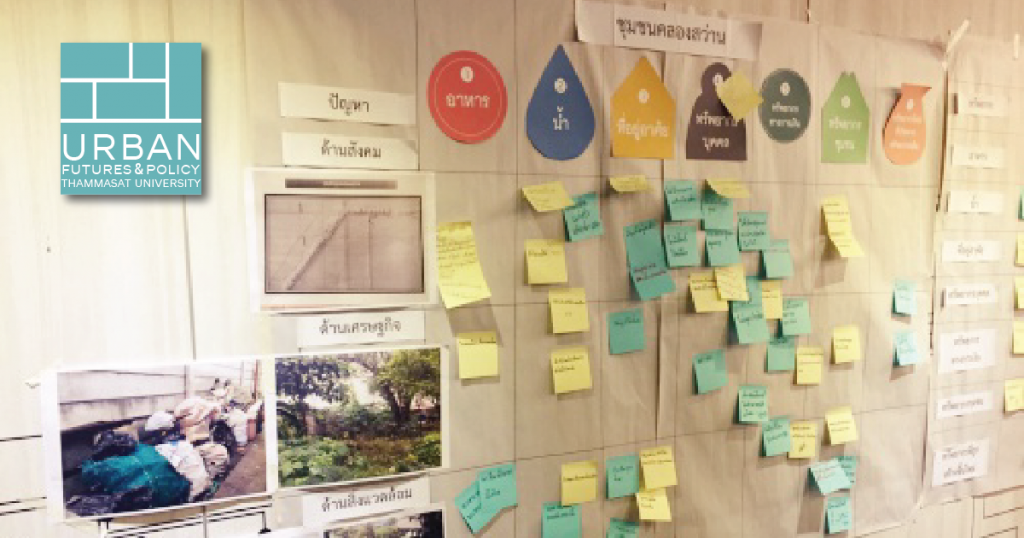urban resilience
Planning for Eco-cities and Climate-resilient Environments: building capacity for inclusive planning in the Bangkok Metropolitan Region (PEACE-BMR)
year 2017-2018
การวางแผนเพื่อเมืองนิเวศน์และสภาพแวดล้อมที่ส่งเสริมความพลวัตของภูมิอากาศ:
การเสริมสร้างขีดความสามารถเพื่อการวางแผนอย่างมีส่วนร่วมในกรุงเทพฯ และปริมณฑล
การเสริมสร้างขีดความสามารถเพื่อการวางแผนอย่างมีส่วนร่วมในกรุงเทพฯ และปริมณฑล
พ.ศ. 2560-2561
Share on facebook
Facebook
Share on google
Google+
Share on twitter
Twitter
Share on linkedin
LinkedIn
Share on whatsapp
WhatsApp

(สำหรับภาษาไทย กรุณาเลื่อนลง)
This collaborative research project aims to strengthen research links between the UK & Thailand to develop existing research capacity on urban climate resilience & inclusive, low carbon development. This collaboration will equip urban actors with the skills and networks to address environmental & climatic issues facing Bangkok, with a specific focus on ensuring the inclusion of particularly vulnerable, low-income communities.
Firstly, IIED supports the development of the UFP team through dedicated training in data analysis, key urban concepts (resilience, inclusion, sustainability) and effective communication of research findings. Secondly, IIED-UFP facilitates a multi-stakeholder workshop with Thai civil society & local government, using innovative communication tools such as games based on city systems dynamics modelling, in order to cultivate a community of practice around inclusive urban development. Thirdly, IIED-UFP completes a joint research piece on the scope to achieve inclusive, low carbon, resilient development in the Bangkok Metropolitan Region, through the Thai urban planning system.
Bangkok has been identified as one of the cities most at risk to the impacts of climate change. The IIED-UFP partnership strengthens the understanding of community organisations of the risks of climate change & actions that can be taken to reduce impacts, including harnessing ecosystem services (such as soil stabilisation and evapotranspiration) to steer Bangkok towards being an eco-city. At the same time, IIED-UFP engages local government officials in the process, opening up opportunities for partnership between local authorities, communities and researchers to more effectively identify and address the risks.
An interactive eco-resilience toolkit, so called “kin-dee, you-dee” or eat-well, live well was designed and tested with a participatory approach. An experienced group of community architects, Openspace, was involved from the outset to help structure the toolkit alongside the research team. The toolkit consists of three modules: (i) a matching word-meaning game, (ii) mapping pictographic playing cards and managing community resources, and (iii) collaborative planning strategies for building community resilience. These three modules encourage social learning towards participatory planning processes and eventually create plans for community resilience.
The first module asks the players to match key words and meanings to learn about sustainability- and resilience-related terms. Simultaneously, the research team also learned from the players what were considered as community resources and what was missing. Results from the first module will therefore serve as first inputs for the second module. In the second module, mapping activities are employed to facilitate thinking and learning about community resources, both in terms of their location and the relationships among them. Each player was asked to pin their pictographic playing cards locating previously identified community resources onto their community map and its surrounding areas. In the final module, players sit around a big empty table to discuss openly about the strategies that could be used to tackle potential future crises by systematically using the previously identified community resources pinned on the community map. The players were asked to pick a few of the most important community resources that were likely to be damaged and the ones that had to be maintained to help to mitigate negative impacts. However, if the players could not think of any resources for this purpose, other possible community resources could be identified as they emerged during the discussion.
(ฉบับภาษาไทย)
ในปัจจุบันความสำคัญของการส่งเสริมความพลวัตให้แก่พื้นที่เมืองให้มีความสามารถในการรับมือกับภาวะวิกฤติที่อาจจะเกิดขึ้นและปัญหาเรื้อรังนั้น ได้มีการยอบรับที่เพิ่มมากขึ้น รายงานของ IPCC’s 5th Assessment Report ได้เน้นถึงความเสี่ยงของการเปลี่ยนแปลงภูมิอากาศที่จะมีต่อเมืองและความจำเป็นที่ท้องถิ่นจะต้องหาแนวทางปฏิบัติที่จะรับมือกับความเสี่ยงเหล่านี้ ซึ่งแนวชายฝั่งของประเทศไทยมีโอกาสที่จะได้รับผลกระทบของการเปลี่ยนแปลงภูมิอากาศ เช่น การเพิ่มขึ้นของระดับน้ำทะเล น้ำท่วม กรุงเทพฯ และปริมณฑล เป็นศูนย์กลางเศรษฐกิจที่ได้รับผลกระทบจากน้ำท่วมมาหลายครั้ง และโดยเฉพาะอย่างยิ่งความเสี่ยงของการเพิ่มขึ้นของระดับน้ำทะเล ควบคู่ไปกับการทรุดตัวของแผ่นดิน รวมไปถึงปรากฎการณ์เกาะความร้อนเมือง ชุมชนรายได้น้อยในเมืองก็มักจะอาศัยอยู่ในพื้นที่ที่เปิดรับต่อน้ำท่วม อยู่อาศัยอยู่ริมคลอง และบ้านเรือนที่ไม่สามารถปรับตัวต่อการเปลี่ยนแปลงภูมิอากาศได้ ด้วยปัจจัยทั้งหลายเหล่านี้ นำไปสู่ความสำคัญต่อการสร้างแผนพัฒนาเมืองให้ส่งเสริมความพลวัตและส่งเสริมการมีส่วนร่วมและนำไปสู่เมืองที่มีความยั่งยืนในอนาคต
ในระดับสากลได้ให้ความสำคัญต่อแนวคิดความพลวัตของเมือง (urban resilience) เพิ่มมากขึ้น ไม่ว่าจะเป็นโครงการ 100 Resilient Cities และ the Asian Cities Climate Change Resilience Network (ACCCRN) รวมไปถึงงานวิจัยที่ถูกริเริ่มขึ้น เหล่านี้ล้วนแต่เน้นให้เห็นถึงความสำคัญของแนวทางการทำงานและวางแผนร่วมกันของหลายภาคส่วน ไม่ว่าจะเป็นผู้ที่มีบทบาทในเรื่องเมือง สถาบัน หรือระบบของเมืองด้านต่างๆ เช่น โครงสร้างพื้นฐาน โดยการปกครองเมือง (urban governance) เกี่ยวข้องกับแนวทางที่ภาครัฐ ภาคเอกชน ประชาสังคมและสถาบันต่างๆ มีอิทธิพลและสามารถจัดการกับการวางแผนและกระบวนการนำแผนไปบังคับใช้ด้วย (Angueloveski & Carmin, 2011) โดยเฉพาะอย่างยิ่งการส่งเสริมให้เกิดกระบวนการวางแผนร่วมกับกลุ่มคนเปราะบาง ที่มักจะถูกผลักออกจากกระบวนการ
เหล่านี้เป็นที่มาของความร่วมมือกันระหว่าง International Institute for Environments and Development (IIED) และ คณะสถาปัตยกรรมศาสตร์และการผังเมือง ม.ธรรมศาตร์ (สถ.มธ.) ที่จะร่วมมือกันเพื่อผลักดันให้เกิดการสร้างขีดความสามารถสำหรับการปกครองเมืองเพื่อรองรับการเปลี่ยนแปลงภูมิอากาศของกรุงเทพฯ และปริมณฑล โดยเป็นการเปิดโอกาสให้เกิดพื้นที่การแลกเปลี่ยน (platform) สำหรับผู้มีส่วนได้ส่วนเสียในเมืองที่หลากหลาย รวมไปถึงตัวแทนจากกลุ่มเปราะบาง และองค์กรที่ทำงานกับกลุ่มคนเหล่านี้ และการเรียนรู้ร่วมกันในการนำไปสู่การสร้างความพลวัตให้แก่สังคมเมือง
วัตถุประสงค์ของโครงการวิจัยนี้คือ
1) เพื่อสร้างองค์ความรู้และขีดความสามารถให้แก่นักวิจัยไทย ชุมชนเมือง และหน่วยงานในการปกครองส่วนท้องถิ่น ให้สามารถจัดให้มีแผนและยุทธศาสตร์ที่เกี่ยวข้องกับการลดผลกระทบของก๊าซเรือนกระจก รวมถึงส่งเสริมแนวคิดความพลวัตของเมืองอย่างมีส่วนร่วม
2) เพื่อสนับสนุนให้เกิดความร่วมมือกันในการวิจัยด้านแนวความคิดความพลวัตของเมืองระหว่างนักวิจัยในไทยและสหราชอาณาจักร โดยเฉพาะอย่างยิ่งการสนับสนุนให้เกิดการพัฒนาบุคลากร และความสัมพันธ์เชิงสถาบันใหม่ๆ รวมไปถึงการนำผลงานวิจัยในระดับสากลมาปรับใช้ในประเทศไทย
3) เพื่อกระตุ้นให้หน่วยงานภาครัฐทำงานร่วมกับผู้มีบทบาทอื่นๆ ที่ไม่ได้มาจากภาครัฐ รวมไปถึงสถาบันการศึกษา ประชาสังคม ในกระบวนการตัดสินใจที่เกี่ยวกับการพัฒนาเมือง ยกตัวอย่างเช่น การใช้เครื่องมือสื่อสารที่มีนวัตกรรม อย่างเช่น บอร์ดเกม
4) เพื่อแนะนำข้อเสนอเชิงนโยบายทีเกี่ยวข้องกับการวางแผนที่ส่งเสริมความพลวัตของเมือง คาร์บอนต่ำ เมืองนิเวศน์อย่างมีส่วนร่วม ที่เหมาะสมกับกระบวนการวางแผนพัฒนาเมืองของประเทศไทย โดยเฉพาะอย่างยิ่งตอบรับกับความต้องการของชุมชนเปราะบางในเมือง
Research Team
Assoc.Prof. Wijitbusaba Marome (รศ.ดร. วิจิตรบุษบา มารมย์)
Faculty of Architecture and Planning, Thammasat University
Asst.Prof. Boonanan Natakun (ผศ.ดร. บุญอนันต์ นทกุล)
Faculty of Architecture and Planning, Thammasat University
Dr.Diane Archer (ดร. ไดแอน อาร์เชอร์)
IIED
